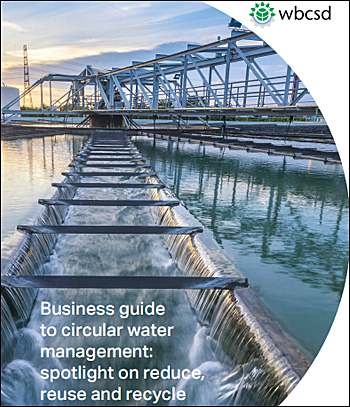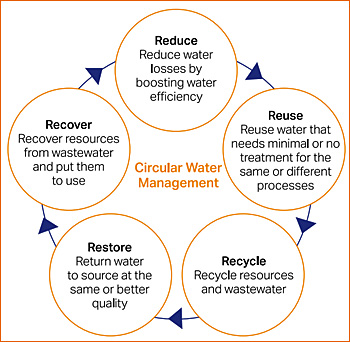Arcadis contributes to WBCSD business guide on circular water management
 Dutch-based consultancy firm Arcadis was one of the advisors to assist the World Business Council for Sustainable Development (WBCSD) to compile the first-of-its-kind guide on circular water management.
Dutch-based consultancy firm Arcadis was one of the advisors to assist the World Business Council for Sustainable Development (WBCSD) to compile the first-of-its-kind guide on circular water management.
The guide brings together decision-making tools, case studies and best practice technologies to help companies seize the opportunities to close the water management practices.
The release of the guide was announced by WBCSD on 7 June. The other two advisors were EDF (France) and Veolia (France).
 Spotlight on reduce, reuse, recycle
Spotlight on reduce, reuse, recycle
All too often, water mistakenly is considered a cheap resource - and wastewater is seen as disposable. This must change, according to WBCSD, the CEO-led organization of over 200 leading businesses working together to accelerate the transition to a sustainable world.
By 2030, the world may face a 40 percent gap in water supply vs demand. At the same time, 80 percent of wastewater currently goes back into the environment untreated.
According to WBCSD, now is the time to explore circular water management solutions and prevent these valuable resources from being lost.
Reducing, reusing and recycling water saves costs and reduces business’ impact on the environment. However, despite the clear-cut business case, circular water management practices have not yet gone into the mainstream.
Key success factors
The Business Guide to Circular Water Management seeks to change this.
It outlines the current barriers to circular water management, key success factors, solutions and tools for implementation.
The guide also showcases successful examples of circular water management solutions from EDF Group, Vale, Procter & Gamble (P&G), L’Oréal, Nestlé, ENGIE, Heidelberg Cement, Shell, Aditya Birla Group (ABG) and BP.
 Water valuation
Water valuation
An important chapter addresses water valuation, that goes further than determining the true cost of water.
According to the guide, the concept of value looks at externalities in order to understand and manage impacts and dependencies on natural resources, and the way these impacts and dependencies interact with societies and economies.
Water valuation assesses the worth of water to different stakeholders under specific circumstances.
The WBCSD Business Guide to Water Valuation 26 determines prices, costs and values associated with six water-related dependencies and impacts.
Taking to scale
Maria Mendiluce, Managing Director of WBCSD’s Natural Capital Area said, “Circular water management practices are now mature enough for companies to take to scale. Such practices help companies reach their sustainability targets, save costs and increase efficiency, while at the same time, benefitting the natural ecosystems that business depends on.
Mediluce continued: "We hope this guide will encourage industries to consider the true value of water as a resource, and by extension, help them view wastewater as an important asset.”
Check out the guide for more information and download (as pdf-file)
This news item was originally published on the website of WBCSD.
Read also on this website
● Arcadis hired to plan water distribution system improvements for city of Flint, USA, 13 December 2016
● IWA Brisbane 2016: Arcadis and KWR agree on development new groundwater resource concepts, 13 October 2016
● Rotterdam tops first global sustainable cities index water by Arcadis, 18 May 2016
More information
Arcadis Global
Amsterdam, the Netherlands
+31 20 2011 011
www.arcadis.com
World Business Council for Sustainable Development (WBCSD)
Geneva, Switzerland
+41 22 839 3100
www.wbcsd.org



